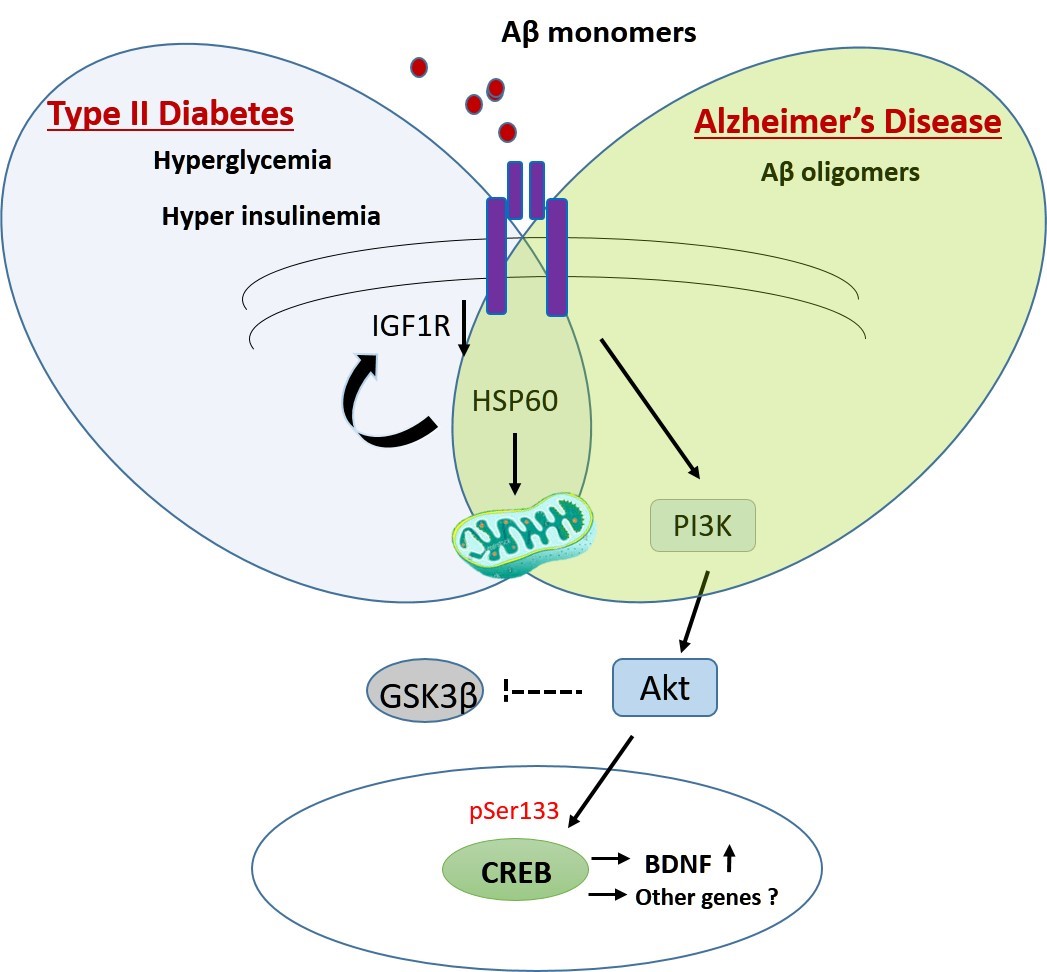LEARNING FROM DIABETES TO TREAT ALZHEIMER’S DESEASE […]
TITLE:
Learning from diabetes to treat Alzheimer’s disease: a role for HSP60 in the regulation of brain IGF-I receptor signaling
FINANCING SCHEME:
SIR (Scientific Independence of young Researchers) 2014, funded by MIUR (Ministero dell’Istruzione dell’Università e della Ricerca).
Proposal number: RBS1148TJD
SHORT DESCRIPTION AND USEFUL INFO:
Alzheimer’s disease (AD) is one of the most common causes of dementia among elderly population. The cost of the disease in terms of social and economic impacts is high and likely to increase. Despite all the scientific effort, AD is still incurable, revealing the urgent need to find new ways of intervention.
Previous data from our group have shown that physiological concentration of monomeric forms of ß-amyloid, are able to promote neuroprotection by activating the IGF-1R signaling (Giuffrida et al., 29, 2009). More recently, we also found that Aβ monomers promoted the increase of pCREBser-133, suggesting that functional loss of monomers could exacerbate the early defects of insulin/IGF-1Receptor signaling also affecting the activation of genes involved with learning/memory (Zimbone et al., Aging Cell 2018). The relevance of IR/IGFI-R signaling in AD brains is considered crucial also in light of new emerging data indicating that Type 2 diabetes (T2DM) can be a risk factor for cognitive decline and dementia, suggesting that common mechanisms such as insulin resistance, trophic factors withdrawal and deficits in energy metabolism can be responsible for the common features shared by the two pathologies (De La Monte SM, BMB Rep. 42, 2009). Interestingly, post-mortem investigations of AD brains, have revealed a decreased expression of cerebral Insulin-like-growth factor IGF-I receptor (IGF-IR) and Insulin receptor substrates (IRS).
The aim of this study is to investigate the potential role of neuronal HSP60 in the modulation of IGF-I receptor level and signaling, as a new potential target in AD. HSP60, has been recently reported to upregulate IGF-1 receptor in cardiac muscle cells. More interestingly, in the streptozotocin (STZ)-induced animal, HSP60 level has been shown to decrease in parallel to IGF-I receptor (Hui-Chin Lai, Am J Physiol Endocrinol Metab 292, 2007). Based on these premises, this work, by the use of molecular biology, cellular and biochemical techniques will investigate the potential correlation between HSP60 and IGF1 receptor in in vitro model of primary neuronal cultures, chronically treated with high concentration of Insulin/glucose or Aβ oligomers to mimic T2DM and AD conditions, respectively. Also, to better investigate the role of HSP60 on brain IGFI-R abundance, APPswe/PS1dE9, and wild type C57BL/6J mice fed with high fat diet, will be used as murine models
PRINCIPAL INVESTIGATOR :
IC-CNR
Via Paolo Gaifami, 18 95126, Catania, Italy
Phone +39 095-7338444
Email: marialaura.giuffridaATgmail.com

